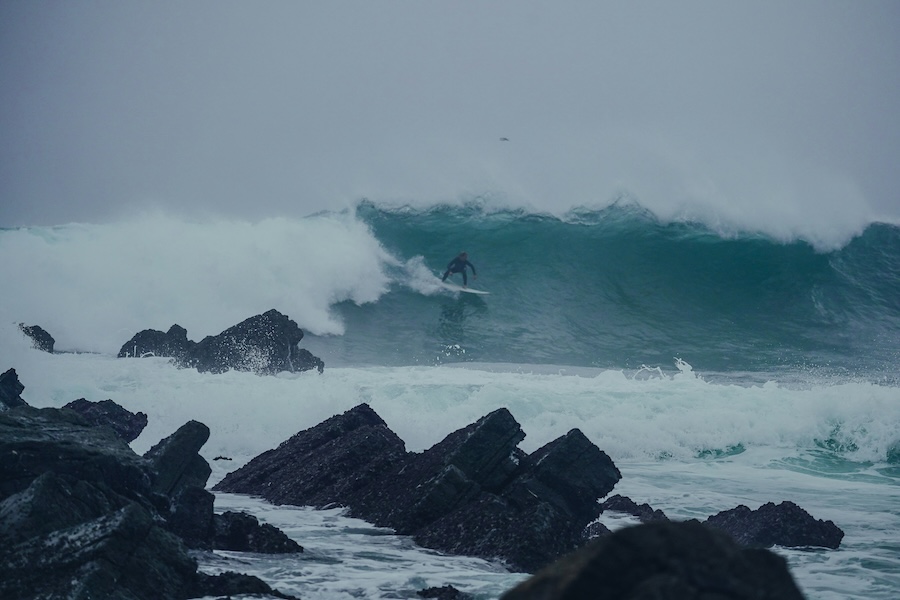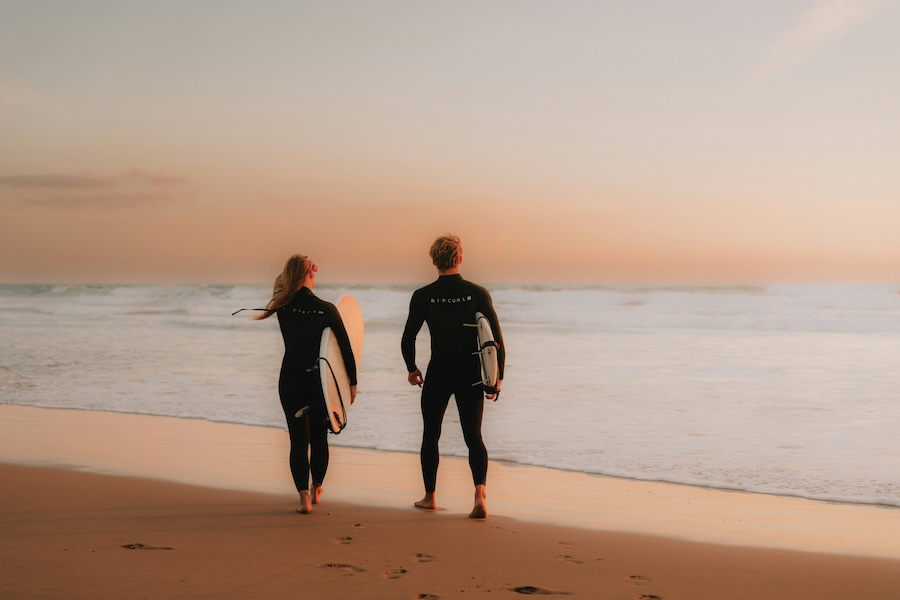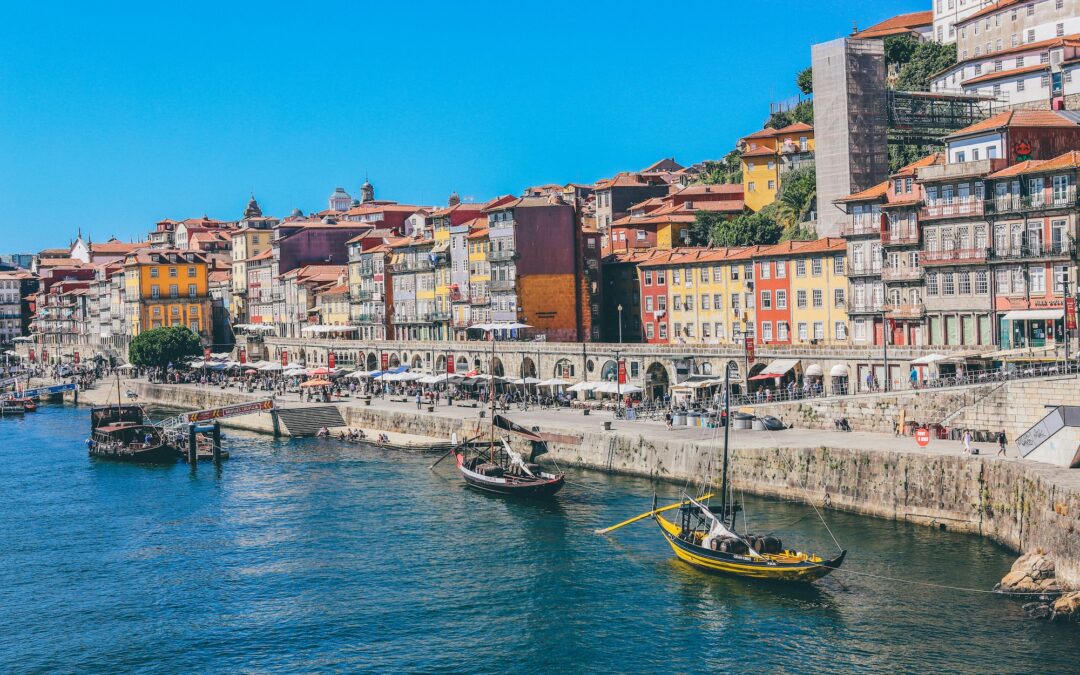
After deciding on where you want to surf, you need to figure out when is the best time to surf in Portugal.
This can be tricky if you’re only new to surfing or you aren’t 100% confident in your forecasting skills.
But fear not!
As owners of a beachside surf camp and longtime surfers, we’ve seen up close how the weather and swell change throughout the year. So consider this your ultimate guide to the best time to surf in Portugal!
What’s all this fuss about ‘surf seasons’?
You probably know there’s a season for everything… and surfing is no different!
While countries in the tropics like Indonesia and Sri Lanka only have two seasons (wet and dry), countries further away from the equator have four distinct seasons.
These seasons, which are determined by weather patterns, also have a significant impact on the surf conditions. The colder months traditionally have bigger swells, while the warmer months are generally more calm.
But it’s not always so. There can be periods of small waves during autumn and winter. There can be large swells in spring and summer. Portugal is an interesting case too. The coastline is so exposed with so many different beaches and surf spots.
This means that it’s possible to find good surfing conditions virtually all year round if you know where to look!
As a rule of thumb though, check this out.
Autumn and winter = Big, powerful, consistently clean waves
Non-equatorial countries have cooler temperatures in autumn and winter, which means stronger winds that travel over thousands of kilometres of open water without interruption. This creates bigger, more powerful and cleaner waves that are perfect for upper intermediate and advanced surfers.
Spring and summer = Smaller, gentler waves
Warmer temperatures in spring and summer mean shorter distances for the winds to travel. This results in smaller, less powerful waves that are more affected by wind conditions. This can be perfect for beginners or early intermediates learning how to catch and ride smaller waves.

A breakdown of the Portuguese surf seasons
Summer
Summer in Portugal, spanning from June to August, presents a unique set of conditions favouring beginners and those looking to enjoy the surf under the sun.
The climate is predominantly warm and inviting, with average temperatures hovering around 25°C to 30°C (77°F to 86°F). Days are long and sunny, granting ample time for both early morning and late afternoon sessions.
The Atlantic Ocean during these months tends to be more temperate, making it ideal for those who prefer not to don a thick wetsuit.
Waves are typically smaller and more manageable, making summer the perfect season for novices to learn and practise their skills.
Speaking of, these swells are primarily generated by local wind patterns, resulting in waves that are less powerful but more frequent – perfect for beginners who don’t want to feel overwhelmed when learning how to surf.
Autumn
Autumn, extending from September to November, is often regarded as the prime surfing season in Portugal for various reasons.
The weather during these months transitions from the warm summer temperatures to slightly cooler, yet still comfortable conditions, ranging from 18°C to 25°C (64°F to 77°F). This change brings about a magical period where the water remains warm enough for surfing without the need for heavy wetsuits, making it ideal for longer sessions.
The climate is generally mild, with occasional rainfall increasing towards the end of the season. However, these are often short-lived and can actually work to enhance the surf conditions by contributing to the formation of offshore winds, which are perfect for creating clean, well-defined waves.
Wave types during autumn undergo a significant transformation, as the swells start to increase in size due to the influence of the North Atlantic’s stronger weather systems moving closer to the coast.
This results in bigger, more powerful waves that are both challenging and exhilarating for surfers.
Winter
Winter in Portugal, spanning from December to February, greets surfers with its own distinct charm.
During this season, temperatures drop to a cooler range of 8°C to 15°C (46°F to 59°F) – time to wear 6/4 or 4/3 wetsuits, people!
The weather is noticeably cooler and can often be wet, with rain more frequent during these months. However, these conditions contribute to the ocean’s dynamism, producing some of the most formidable swells seen all year.
The Atlantic Ocean during winter becomes a haven for intermediate and advanced surfers due to the increased wave size and power.
Swells are predominantly generated by deep Atlantic lows, travelling vast distances before hitting the Portuguese coast, resulting in big, clean and consistent waves.
Although the wind might still affect surf conditions, the combination of offshore winds and heavy swells often create perfect surfing conditions, making winter an ideal time for experienced surfers looking for an exhilarating challenge.
Spring
Spring, from March to May, marks a period of transition in Portugal, offering a blend of conditions suitable for a wide range of surfers.
The climate gradually warms, with temperatures sitting comfortably between 15°C to 20°C (59°F to 68°F), providing a much-welcomed relief after the cooler winter months. Days begin to lengthen, offering more daylight for surf sessions.
This season is characterised by its consistent yet moderate swells, as the intense winter activity in the Atlantic starts to calm. The mix of rain and sunshine also balances the offshore and onshore winds.
Waves during spring are generally more forgiving than in winter, making it an ideal time for those looking to progress from beginner to intermediate levels. The countryside also comes alive with lots of greenery and active waterfalls – we love spring for another reason too… Portugal is yet to be flooded with the summer tourists!
When is the best time to surf in Portugal?
So, want to know the ultimate answer to when is the best time to surf in Portugal? The truth is… there isn’t one!
The beauty of Portugal as a surfing destination lies in its year-round appeal, offering something for every surfer regardless of skill level.
Spring and summer see smaller, more manageable waves that are perfect for beginners and those looking to enjoy a leisurely surf session. However, there are also suitable beginner and intermediate waves in autumn and winter too – it really comes down to your personal preferences.
If in doubt, send an email to Loïc at our surf camp.
He’ll be more than happy to provide you with tailored recommendations based on your surfing level and what you’re looking for in a surf experience!
Portugal’s surf seasons FAQ
Q. When is the best Portugal surf season for beginners?
The optimal surf season in Portugal for beginners would be during the summer months, from June to August.
During this period, the waves are generally more manageable, creating an ideal learning environment for novices.
The warm climate and temperate waters further contribute to a comfortable and inviting setting for those just starting out on their surfing journey.
Additionally, the longer daylight hours offer ample time for practice and improvement.
Q. What is the best surf season for advanced surfers in Portugal?
The prime season for advanced surfers in Portugal is undoubtedly late autumn and winter, particularly from November to January.
This period offers a perfect blend of large, powerful swells, creating challenging yet rewarding waves that cater to the needs of more experienced surfers looking to test their skills.
Q. What should I wear during the different seasons?
Your surfing attire in Portugal will largely depend on the time of year you choose to hit the waves.
During the summer months (June to August), a 3/2 or 4/3 wetsuit should suffice in the north. In the south, you can get away with a 3/2 or even boardshorts and a wetsuit top or bikini wetsuit during summer.
Moving into autumn (September to November), a 4/3 will ensure comfort as the water starts to cool. Winter (December to February) demands a 5/4 or thicker if you want to brave the cooler waters and air temperatures.
Finally, with the arrival of spring (March to May), you can transition back to a 4/3 or 3/2 wetsuit as temperatures begin to rise.
Always consider a wetsuit’s thickness and your tolerance to cold when choosing your surf attire to maximise your time in the water.
Then again, you could just book with us and let our team look after all of your surf equipment needs – including wetsuits!
Q. Can we expect consistent waves throughout the year in Portugal?
Yes, Portugal is renowned for its consistent waves year-round.
Thanks to its unique geographical location on the edge of the European continent facing the vast Atlantic Ocean, Portugal benefits from a wide range of swells.
Different seasons bring varying wave conditions, making Portugal a versatile surfing destination that can accommodate surfers of all levels throughout the year.


